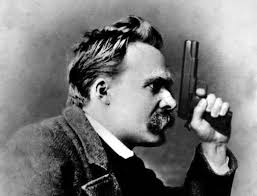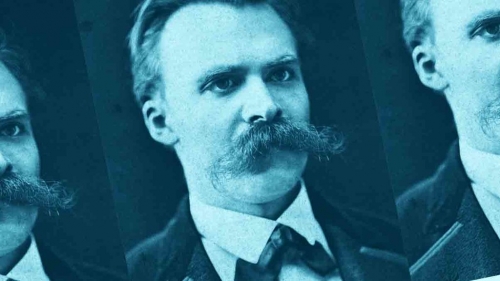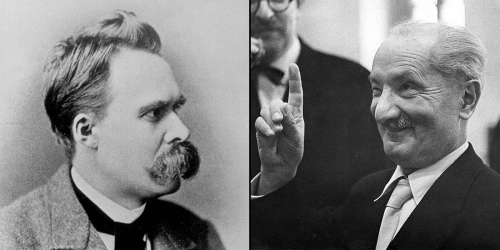Ronald Beiner
Dangerous Minds: Nietzsche, Heidegger, and the Return of the Far Right
Philadelphia: University of Pennsylvania Press, 2018
 Ronald Beiner is a Canadian Jewish political theorist who teaches at the University of Toronto. I’ve been reading his work since the early 1990s, starting with What’s the Matter with Liberalism? (1992). I have always admired Beiner’s clear and lively writing and his ability to see straight through jargon and cant to hone in on the flaws of the positions he examines. He is also refreshingly free of Left-wing sectarianism and willing to engage with political theorists of the Right, like Leo Strauss, Eric Voegelin, Michael Oakeshott, and Hans-Georg Gadamer. Thus, although I was delighted that a theorist of his caliber had decided to write a book on the contemporary far Right, I was also worried that he might, after a typically open and searching engagement with our outlook, discover some fatal flaw.
Ronald Beiner is a Canadian Jewish political theorist who teaches at the University of Toronto. I’ve been reading his work since the early 1990s, starting with What’s the Matter with Liberalism? (1992). I have always admired Beiner’s clear and lively writing and his ability to see straight through jargon and cant to hone in on the flaws of the positions he examines. He is also refreshingly free of Left-wing sectarianism and willing to engage with political theorists of the Right, like Leo Strauss, Eric Voegelin, Michael Oakeshott, and Hans-Georg Gadamer. Thus, although I was delighted that a theorist of his caliber had decided to write a book on the contemporary far Right, I was also worried that he might, after a typically open and searching engagement with our outlook, discover some fatal flaw.
But it turns out that an honest confrontation with our movement is a bridge too far. Beiner does not even wish to engage with our ideas, much less critique them. Instead, he uses the rise of the Right simply as lurid packaging to sell his publisher a book that focuses on Nietzsche and Heidegger. (The cover is of the torchlight march at Unite the Right, which is supposed to look sinister.)
Beiner’s target is not the Right, but the Left, specifically those who think that Nietzsche and Heidegger can be profitably appropriated for Left-wing causes. To combat this view, he mounts a persuasive case that Nietzsche and Heidegger are deeply anti-liberal thinkers. Thus, although Dangerous Minds is sensationalist and dismissive in its treatment of our movement, it is nevertheless extremely useful to us. If anyone wants to understand why Nietzsche and Heidegger are so useful to the New Right, Beiner gives a clear and engaging account in a bit more than 100 pages.
Since Beiner wants to cast our movement in the worst possible light, he naturally begins with Hailgate [2]:
In the fateful fall of 2016, a far-right ideologue named Richard B. Spencer stirred up some fame for himself by exclaiming in a conference packed with his followers not far from the White House: “Hail Trump! Hail our people! Hail victory!” On the face of it, this mad proclamation would appear to have nothing in common with the glorious tradition of Western philosophy.
But think again.
Beiner then quotes Spencer denouncing “fucking middle class” values and proclaiming “I love empire, I love power, I love achievement.” We even learn from a Jewish female reporter that Spencer will sometimes “get a boner” from reading about Napoleon. (Another triumph of press engagement [3].)
This is Nietzsche’s work, declares Beiner.
Beiner goes on to call Spencer a “lunatic ideologue” (p. 11) and an advocate of “virulently antiliberal, antidemocratic radicalism” (p. 12). He blames it all on a graduate seminar on Nietzsche that Spencer took at the University of Chicago. This is laying it on a bit thick, since Spencer is not offering a system of ideas. He’s just name-dropping and Nietzsche-posting to impress middlebrow journalists. Perhaps sensing this, Beiner turns his attention to a prolific author of essays and books, Alexander Dugin. Beiner easily establishes the Nietzschean and Heideggerian pedigree of Dugin’s dangerous ideas.
Naturally, at this point, I was wondering if I was next, so I flipped to the back of the book to see if my name appeared in the index. But there is no index. (This from a serious academic publisher?) So I continued to read. By the end, I was a bit relieved, and maybe a bit miffed, to receive no mention at all in Dangerous Minds. Nor is Counter-Currents mentioned by name, although it is referred to on page 12 as “One of the typically odious far-right websites” and on page 150 as “Another far-right outfit of the same ilk” as Arktos. In the first case, Beiner refers to James O’Meara’s review of Jason Jorjani’s Prometheus and Atlas [4], but he does not name O’Meara or give the url of the review. (Jorjani is, however, singled out for abuse as a “crackpot philosopher.”) In the second case, Beiner provides the url of my Heidegger commemoration [5] but does not cite the author or title. Beiner is known as a Left-wing admirer of Leo Strauss and Allan Bloom. These glaring oversights might lead those of a Straussian bent to think that Beiner regards Counter-Currents, James O’Meara, me, and perhaps Collin Cleary [6], who is also noticeably omitted, to be of central importance. But of course he has plausible deniability.

Beiner zeroes in on equality as the essential issue that divides the Left and the Right:
A view of society where all individuals are fundamentally equal or a view of society where people can live meaningful lives only under the banner of fundamental hierarchy: this is an either/or, not a moral-political choice that can be submitted to compromise or splitting the difference. . . . [O]ne either sees egalitarianism as essential to the proper acknowledgement of universal human dignity, or one sees it as the destruction of what’s most human because its incompatible with human nobility rightly understood. (p. 8)
This is basically correct, but I have two caveats.
First, I think equality and liberty are genuine political values. But they are not the most important values. Individual self-actualization and the pursuit of the common good are more important than individual liberty, for instance. And justice is more important than equality, since justice requires unequal people receive unequal treatment. But even here, justice demands that unequal status and rewards be proportionate to unequal merit. By this Aristotelian view of justice, however, most forms of contemporary social and political inequality are grossly unjust.
This is why I oppose people on the Right who praise “hierarchy” as such. Not all hierarchies are just. Thus one can defend the principle of hierarchy without embracing ideas like hereditary monarchy, aristocracy, and caste, much less slavery. These are at best merely imperfect historical illustrations of the principle of hierarchy, not blueprints for the future.
Second, the notion of “universal human dignity” is simply an article of faith, like Stoic and Christian ideas of providence and liberal ideas of progress. Progress and providence are our trump cards against ultimate misfortune. They allow us to keep believing that things will work out in the end. “Dignity” is really a trump card against dehumanization: it is the assertion that no matter how botched, degraded, and corrupt a human being is, he is still a human being; he still possesses some intrinsic worth that he can use, as a measure of last resort, to gain some consideration from the rest of us. But when aliens land and discover that human beings are delicious, appeals to the universal dignity of rational beings are not going to save us. True nobility requires that we face reality and dispense with such moralistic illusions.

But that does not mean that we dispense with empathy for others. I have zero patience for people on the Right who defend slavery, colonialism, imperialism, and genocide. They are guilty of another form of providential wishful thinking, for they apparently feel themselves invulnerable to the sufferings they would cheerfully inflict on others. It does not occur to them that others could do the same to them. But nobility requires thinking and living without such illusions. You might be high and mighty today, but you are not bulletproof (which is really all Hobbes meant by equality). Empathy allows us to imagine ourselves in the positions of others. Fortune can elevate or lower us into the positions of others. And if none of us are immune to fortune, then we should create a political system in which we could morally bear to trade places with anyone, a society in which all social stations are fundamentally just. This leads to the sort of live-and-let-live ethos that is at the core of ethnonationalism as I define it.
This is why I don’t regard Alexander Dugin and Richard Spencer as contributing anything to White Nationalism, which is the advocacy of ethnic self-determination for all white peoples. Instead, they are simply apologists for Russian imperial revanchism. Spencer regards ethnonationalism as “petty,” siding with the UK against Scottish independence, the EU against Brexit, and Spain against Catalan independence. But although he opposes the UK leaving the EU, he opposes Ukraine joining it. He praises the EU as a transnational, imperial organization — but not NATO. Clearly, he is more interested in shilling for Russian geopolitical interests than in setting forth a coherent moral and political framework for white survival. I can’t blame Beiner for focusing on Dugin and Spencer, however, because they embrace all of Nietzsche’s most lurid and questionable ideas as well as his good ones.
Beiner on Nietzsche
According to Beiner’s chapter on “Reading Nietzsche in an Age of Resurgent Fascism,” the “one central, animating Nietzschean idea” is: “Western civilization is going down the toilet because of too much emphasis on truth and rationality and too much emphasis on equal human dignity” (p. 24). (This passage also illustrates the vulgar and often hysterical tone of Beiner’s polemic. Dangerous Minds has a rambling, informal, often autobiographical style that makes it read like an extended blog post. Beiner also peppers his prose with exclamation points, sometimes 4 or 5 to the page, to drive his points home. I began to worry that he would soon resort to emoticons.)
Nietzsche offers two arguments against liberalism. First, liberalism destroys the meaning of life. Second, liberalism destroys human nobility.
For Nietzsche, a meaningful life requires a normative culture as the context or “horizon” in which each individual is immersed and formed. In short, a meaningful life is rooted in ethnic identity, although Nietzsche does not put it in these terms, as he was deeply alienated from and ambivalent about his own German identity. A normative culture provides an encompassing worldview and a hierarchy of values. These need not be “true” in any metaphysical sense to provide foundations for a meaningful life. Hence the danger of modernity’s high value for truth and rationality. These horizons are always plural (there are many different cultures), and they are closed (they generate differences between insiders and outsiders, us and them; thus they are “political” in Carl Schmitt’s sense of the word).
Liberalism destroys meaning because it is cosmopolitan and egalitarian. Its cosmopolitanism opens horizons to other cultures and undermines attachment to one’s own culture. Its egalitarianism overthrows value hierarchies that make people feel bad about themselves. The result is the collapse of rootedness and meaning and the emergence of nihilism. This is why Nietzsche “regards old-fashioned nineteenth-century liberalism — to say nothing of radicalized twentieth- and twenty-first century versions — as rendering culture per se impossible” (p. 34).
 Beiner doesn’t offer a very clear account of why Nietzsche thinks liberalism undermines human nobility. The short answer is that it is simply the political application of the slave revolt in morals, in which the aristocratic virtues of the ancients were transmuted into Christian and eventually liberal vices, and the vices of the enslaved and downtrodden were transmuted into virtues.
Beiner doesn’t offer a very clear account of why Nietzsche thinks liberalism undermines human nobility. The short answer is that it is simply the political application of the slave revolt in morals, in which the aristocratic virtues of the ancients were transmuted into Christian and eventually liberal vices, and the vices of the enslaved and downtrodden were transmuted into virtues.
But what makes us noble in the first place? Like Hegel, Nietzsche believes that human nobility shows itself by triumphing over the fear of death and loss and doing beautiful and noble things in spite of them. Thus, human nobility is essentially connected with facing up to the tragic character of human life and finding the strength to carry on.
Liberalism, like Platonism, Stoicism, and Christianity, is anti-tragic because it is based on faith in providence, the idea that the universe is ruled by and directed toward the good — appearances to the contrary notwithstanding. Providence denies the ultimate reality of loss, finitude, and evil, blinding us to the tragic dimension of life and replacing it with the stoner mantra that “it’s all good.” It is a delusion of ultimate metaphysical invulnerability to evil and loss.
Modern liberals replace faith in providence with faith in progress, which they believe will result in the perfection of mankind and the amelioration of human suffering and evils. It is a false vision of the world that smothers the possibility of human nobility. Although Beiner has the chutzpah to suggest that maybe Nietzscheans can ennoble themselves by enduring life in the “iron cage” of modernity and learning to love the Last Man (p. 116). (Why not ennoble oneself even more by living with head-lice as well?)
The plurality of horizons also means the possibility of existential conflict and the necessity of choosing and taking responsibility for one’s choices. As Schmitt argued, however, the whole liberal ethos is to replace the government of responsible choosers — the sovereign — with the government of laws, rules, and anonymous bureaucrats.
Beiner doesn’t delve too deeply into Nietzsche’s views of nobility because he wants to hang them on Nietzsche’s praise of slavery, caste, war, and cruelty. But while it is true that these phenomena accompanied the emergence of aristocratic values — and most of what we recognize as high culture, for that matter, for the leisure that gave rise to science and culture was secured by the labor of slaves — one can legitimately ask if it is possible to bring about a rebirth of aristocratic values and high culture without first becoming barbarians again. For instance, this is the utopia offered by Social Credit, the preferred economic theory of interwar Anglophone fascists, who hoped to unleash human nobility and creativity once machines put us all out of work.
But if we cannot renew civilization without starting over from scratch, then I would gladly hit the reset button rather than allow the world to decline endlessly into detritus. Thus, on Nietzschean and Heideggerian grounds, it makes sense to try to renew the world, because if one fails, that failure might contribute to the civilizational reset that we need. Indeed, the more catastrophic the failure, the greater the chance of a fresh start. The only way we can’t win is if we don’t try.

Beiner on Heidegger
Beiner’s chapter on “Reading Heidegger in an Age of Resurgent Fascism” is less incisive than his account of Nietzsche, largely because he does not see how close Heidegger really is to Nietzsche. Beiner takes Heidegger’s question of Being at face value and finds it rather bizarre that Heidegger could think that modern civilization is going to hell because of forgetting about Being. But for Heidegger Being = meaning [7], and the modern oblivion of Being is basically the same thing that Nietzsche meant by the collapse of closed normative horizons and the rise of nihilism. Indeed, Heidegger’s concept of Dasein simply refers to man as a being situated within and defined by horizons of meaning. The occlusion of these horizons by the false individualism and cosmopolitanism of modernity leads to nihilism, a life deprived of meaning.
Heidegger thought National Socialism could bring about the spiritual renewal of the German people — and presumably any other nation that tried it — by rejecting cosmopolitanism and individualism and reaffirming the rootedness, community, and the closed horizon of the nation. He rejected National Socialism when he came to see it as just another form of modern technological nihilism. Nietzsche, of course, rejected German nationalism, but Heidegger’s thinking was truer to the implications of Nietzsche’s thinking about the closed cultural horizons that grant meaning.
Beiner is at his best in his reading of Heidegger’s “Letter on Humanism,” his post-war statement publicly inaugurating “the late Heidegger.” Beiner correctly discerns that Heidegger’s lament against the “homelessness” of modern man and his loss of Heimat (homeland) is an expression of the same fundamentally reactionary, anti-modern, anti-cosmopolitan, and pro-nationalist sentiments that led him to embrace National Socialism. Indeed, there’s good reason to think that Heidegger never changed his fundamental political philosophy at all. The only thing that changed was his evaluation of National Socialism and his adoption of a more oblique and esoteric way of speaking about politics under the repressive conditions of the Occupation and the Federal Republic. Carrying out Heidegger’s project of offering a case for a non-nihilistic, non-totalitarian form of ethnonationalism is the project of the New Right as I define it.
Heidegger and the Holocaust
Beiner, like many Jewish commentators, seems to feel that Heidegger owes him a personal apology for the Holocaust. We are told that Heidegger’s silence about the Holocaust is unforgivable. But when we point out that Heidegger did say something about the Holocaust, namely that it was a sinister application of mechanized modern mass slaughter to human beings, we are told that this view is also unforgivable, since the Holocaust somehow transcends all attempts to classify and understand it. Which would seem to require that we say nothing about it at all, but we have already learned that this is unforgivable as well.
Beiner tells the story of Rudolf Bultmann’s visit to Heidegger after the war, when he told Heidegger, “Now you must like Augustine write your retractions [Retractiones] . . . in the final analysis for the truth of your thought.” Bultmann continues: “Heidegger’s face became a stony mask. He left without saying anything further” (p. 119).
Beiner treats this as outrageous. But Heidegger’s reaction is not hard to understand. He had nothing to retract. He felt that he had done nothing wrong. He was not responsible for the war or the Holocaust. They were none of his doing or his intention. They were part and parcel of the very nihilism that he opposed. The fact that the National Socialist regime went so terribly wrong did not refute Heidegger’s basic diagnosis of the problems of modern rootlessness and nihilism but rather proved how all-pervasive they were. Nor did anything the Nazis did refute the deep truth of ethnonationalism as the political corollary of spiritually awakening from the nightmare of liberal modernity. Thus Heidegger absolutely refused to say anything about the war or the Holocaust that could be interpreted as conceding that modern liberal democracy had somehow been proven true. Instead, he continued to make essentially the same arguments as he made before the war, but in more esoteric terms by focusing on rootlessness and technology.

Bultmann was telling Heidegger to lie, to retract beliefs he believed were true, and to do it in the name of “the truth of [his] thought” when in fact the only motive could be to win the approval of the victors. But that approval was something Heidegger decided to do without. Frankly, Bultmann was making an indecent proposal, and Heidegger’s stony silence was admirably restrained.
Beiner mentions that according to Gadamer, Heidegger “was so preoccupied by modernity’s forgetfulness of Being [rootlessness, nihilism] that even the Nazi genocide ‘appeared to him as something minimal compared to the future that awaits us’” (p. 107). Here’s another unforgivable statement breaching Heidegger’s unforgivable silence. But this unforgivable statement is, unfortunately, quite prophetic. For the consummation of global technological civilization, including the erasure of borders and the destruction of roots, will lead to a genocide far vaster and more complete than the Holocaust. I refer the reader to my essays “White Extinction [8],” “White Genocide [9],” and especially “Why the Holocaust Happened, and Why It Won’t Happen Again [10].”
A New Age of Gods?
Both Nietzsche and Heidegger think that spiritual health requires unreflective belief in and commitment to a closed, normatively binding cultural horizon. Christianity, post-Socratic philosophy, and the Enlightenment, however, made self-reflection and universal truth into transcendent values. But as Nietzsche argued, this was a self-defeating move, for Christianity could not stand up to rational criticism. Reason soon escaped the control of the Church, which led to the downfall of Christianity (Nietzsche’s “death of God”), the erasure of the West’s horizon, and the rise of modern nihilism. It follows that the return to spiritual health requires the emergence of a new age of unreflective belief and commitment. Giambattista Vico called this an “Age of Gods,” the first age of a new historical cycle.
The great question is: can a new “Age of Gods” emerge within the context of our present civilization, or must the modern world perish utterly, completely liquidating the Western tradition of philosophy, science, and liberalism, so that mankind can truly believe, belong, and obey again? The new horizons and myths that we need, moreover, cannot be “chosen,” for adopting a belief system as a matter of choice is not an alternative to nihilism, it is just an expression of it. Genuine belief is not chosen. It chooses you. It does not belong to you. You belong to it.
Nietzsche believed that a new age of gods could be imposed by great philosopher-legislators who could create new myths and new tables of values. Under Nietzsche’s sway, Heidegger believed this as well, and it accounts for why he thought National Socialism could lead to a spiritual renewal of Germany. It was only later that Heidegger realized that National Socialism was not an alternative to nihilism, but an expression of it.
It was at this point that Heidegger began his great confrontation with Nietzsche in the mid-1930s. Heidegger later told Gadamer that “Nietzsche ruined me.” Nietzsche ruined Heidegger by offering him nihilism as a cure for nihilism. Nietzsche made Heidegger a Nazi. Heidegger overcame Nazism by overcoming Nietzsche.
 In Heidegger’s later terminology, Nietzsche and National Socialism were both “humanistic,” premised on the idea that the human mind creates culture, whereas in fact culture creates the human mind. No genuine belief can be chosen. It has to seize us. This is one of the senses of Heidegger’s later concept of Ereignis, often translated “the event of appropriation”: the beginning of a new historical epoch seizes and enthralls us. This is the meaning of Heidegger’s later claim that “Only a god can save us now” — as opposed to a philosopher-dictator.
In Heidegger’s later terminology, Nietzsche and National Socialism were both “humanistic,” premised on the idea that the human mind creates culture, whereas in fact culture creates the human mind. No genuine belief can be chosen. It has to seize us. This is one of the senses of Heidegger’s later concept of Ereignis, often translated “the event of appropriation”: the beginning of a new historical epoch seizes and enthralls us. This is the meaning of Heidegger’s later claim that “Only a god can save us now” — as opposed to a philosopher-dictator.
One could, however, read Nietzsche in a non-humanistic way, if one sees his rhapsodies to the Übermensch, the philosopher-legislator, and the coming century of global wars (yes, Nietzsche predicted that) not as a solution to modern nihilism, but as an intensification of it to the breaking point as a way of hurrying along the downfall of the modern world and inaugurating a new age of gods. (“That which is falling should also be pushed.”) If this is Nietzsche’s true view, then offering nihilism to cure nihilism is not a self-contradiction, it is just sound homeopathic medicine.
Beiner asks “are any of us really prepared to entertain the possibility of the comprehensive cancelling-out of modernity to which Heidegger in his radicalism seems committed?” (p. 105). Elsewhere he asks “. . . with what do we undertake to replace [liberal modernity]? A regime of warriors and priests? A return from Enlightenment to magic?” (p. 132). But Beiner is asking these questions from within liberal modernity, and of course from within that perspective, people are going to cling to liberalism simply out of fear. From Heidegger’s point of view, we will only have a solution when individuals can no longer pose such questions. Instead, the answers will be imposed upon us by historical forces outside our comprehension or control.
A Smug Criticism of Smugness
Beiner’s conclusion, “How to Do Theory in Politically Treacherous Times,” is, like the rest of his book, directed to Leftist academics. He makes a strong case against the smugness and complacency of contemporary political theorists, who think they can ignore the Right because we have been refuted by history: “For Rawls, Rorty, and Habermas, Nietzsche has been refuted by history and sociology. He hasn’t! He can only be refuted by a more compelling account of the human good” (p. 125). This is excellent advice, but it ill-accords with Beiner’s own supremely smug, question-begging, and dismissive tone throughout Dangerous Minds. Judging from what he does, as opposed to what he says, Beiner’s real aim is not to intellectually engage the Right, but to censor and suppress it. But if Beiner really does want to debate the philosophical foundations of the New Right, I’m game.
Should We Read Heidegger and Nietzsche?
If Nietzsche and Heidegger are so dangerous to liberal democracy, shouldn’t something be done to keep their books out of the hands of impressionable young men?
Beiner ends his discussion of Nietzsche by referring to Leo Strauss’s advice to Canadian conservative political philosopher George Grant, who was about to embark on a series of popular radio lectures on Nietzsche. Strauss viewed Nietzsche as a profoundly dangerous thinker and advised Grant not to talk about Nietzsche at all but simply refer to his “epigones” Freud and Weber. The only reason Beiner brings this up, of course, is to plant the idea that academics should drop Nietzsche from the canon. Beiner, however, strenuously denies that this is his intent in his Introduction:
Hopefully no reader of my book will draws from it the unfortunate conclusion that we should just walk away from Nietzsche and Heidegger — that is, stop reading them. [Of course reading them does not necessarily entail teaching them, especially to undergraduates.] On the contrary, I think that we need to read them in ways that make us more conscious of, more reflective about, and more self-critical of the limits of the liberal view of life and hence what defines that view of life. But if one is handling intellectually radioactive materials, one has to be much less naïve about what one is dealing with. . . . We need to open our eyes, at once intellectually, morally, and politically, to just how dangerous they are. (p. 14)
But this seems disingenuous in light of Beiner’s repeated assertion that Nietzsche and Heidegger should have censored their own ideas insofar as they are dangerous to liberal modernity:
There is a kind of insane recklessness to Nietzsche — as if nothing he could write, no matter how irresponsible, no matter how inflammatory, could possibly do any harm. All that matters is raising the stakes, and there is no such thing as raising the stakes too high. (p. 63)
One has to ask: “To whom does Beiner think Nietzsche is being irresponsible? What could his thought possibly harm?” The answer, of course, is the modern liberal democratic world, the world that Nietzsche rejects, the world that Nietzsche crafted his doctrines to destroy.
 Beiner is even more blatant in his advocacy of self-censorship in Heidegger’s case:
Beiner is even more blatant in his advocacy of self-censorship in Heidegger’s case:
Near the end of his life, Heidegger decided to include the Black Notebooks (including explicitly racist passages conjuring up a diabolical conspiracy on the part of “World Judaism” [sic: World Jewry]) in the official Collected Works, whereas any reasonably sane person would have burned them, or at least burned the most incriminating passages. It’s as if he either were trying to spur a revival of fascist ideology or intended to confess to the world just how grievously stained he had been by that ideology. All of this is thoroughly damning. (pp. 113–14)
Again, one must ask: “Sane by whose standards? Incriminating to whom? Damning by whose standards?” The answer, of course, is: modern liberal democrats. But Heidegger thought these people were intellectually benighted and morally corrupt. So why should be censor his thought to conform to their sensibilities? To hell with them. He was addressing himself to freer minds, to a better world, to generations yet to come.
At the beginning of his Heidegger chapter, Beiner also writes:
The question I’m raising in this chapter is whether, finding ourselves now in a political landscape where the possibility increasingly looms of Heidegger as a potential resource for the far right, it might be best for left Heideggerianism (a paradox to being with) to close up shop. (p. 67)
Since virtually everyone teaching Heidegger in academia today is a Leftist, this basically amounts to removing Heidegger from the canon. Beiner’s talk of looming possibilities and potential resources is off the mark, for Heidegger already is a resource and inspiration for the New Right, and he knows this. (Frankly, I hope Left-wing Heideggerians close up shop soon. It would be an ideal opportunity to launch the Heidegger Graduate School [11].)
It is absurd to wish that Nietzsche and Heidegger had censored their ideas to remove their challenges to the system they despised and wished to destroy. If liberals want to stop these ideas from influencing policy, they need to refute them. Demanding censorship is simply an admission that one cannot refute ideas rationally and thus must repress them. Asking one’s opponents to engage in self-censorship takes some brass. If liberals can’t refute anti-liberals like Nietzsche and Heidegger, they are just going to have to screw up their resolve and do their own censorship. This is hardly a stretch, sadly, since the suppression of dissent is second nature to modern academics. It’s really all they have left.
Indeed, if wishing aloud that Nietzsche and Heidegger had censored themselves has any practical meaning today, it is as a suggestion that political theorists and philosophers censor themselves and their syllabi, i.e., remove Nietzsche and Heidegger from the canon.
If Beiner is really arguing that Leftists should stop teaching Nietzsche and Heidegger, he apparently did not anticipate what would happen if his book fell into the hands of Rightist readers like me. For Dangerous Minds, despite its obnoxious rhetoric and smug dismissal of our movement, is a very helpful introduction to Nietzsche and Heidegger as anti-liberal thinkers. Thus I recommend it highly. And if I have anything to say about it, this book will help create a whole lot more dangerous minds, a whole new generation of Right-wing Nietzscheans and Heideggerians.





 del.icio.us
del.icio.us
 Digg
Digg